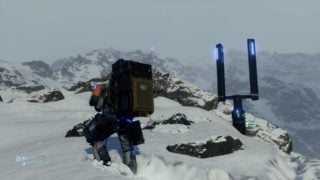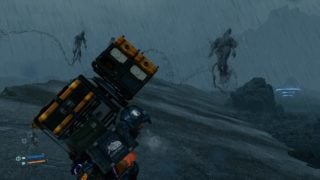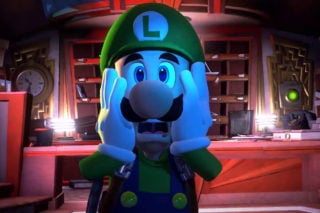Review: Death Stranding is an unwieldy, obnoxious epic
Hideo Kojima’s first game after Metal Gear keeps tripping itself up
- Game director
- Hideo Kojima
- Key Credits
- Yoji Shinkawa (Lead artist), Ludvig Forssell (Composer)

The humble fetch-quest is one of the open world genre’s most despised conventions. Death Stranding, Hideo Kojima’s first project since washing his hands of Konami and Metal Gear Solid, gives you 40 to 50 hours of them.
Eschewing combat for the most part, it is a game about ferrying crates between waystations in a desolate world, plotting and trudging along a dotted line on your map screen, again and again. It might sound perverse, but in practice, Death Stranding‘s post-apocalyptic courier premise proves to be its strongest feature. It creates a deep appreciation for some magnificent geography, which is at once powerfully empty and filled, Dark-Souls-style, with messages and objects left behind by other online players.
The premise also serves as an engaging, half-witting exploration of the parallels between videogame quest design and real-life gig work, teed up by a script that explores the topic of social breakdown in a time of ecological crisis.
Sadly, that script is more often Death Stranding’s worst enemy. Though free, at least, of Metal Gear’s decades’ worth of backstory, Kojima’s debut as an indie is his worst-written videogame fable to date. Set in a near-future America reduced to wilderness by a breach between the realms of living and dead, it’s a bloated heap of half-baked twists, laboured morals, armchair philosophy and boneheaded sci-fantasy metaphors.
The script is at once very obtuse, tucking its secrets behind spy-movie acronyms, and ploddingly obvious, with characters often explicitly named for what they represent within a plot that is at least 10 hours (and two credit sequences) too long. Consider the leading man: Sam Porter Bridges, a porter who builds bridges, hired by a subterranean organisation – also called “Bridges”, and founded by a woman named Bridget – to reconnect a country ravaged by ghosts and supernatural rainfall that accelerates time for anything it touches.
Sam is played by Norman Reedus, who heads a sparkling cast of A-listers, including Léa Seydoux as mournful fellow porter Fragile and Pan’s Labyrinth director Guillermo del Toro as Deadman, your faintly mischievous boffin-on-demand. The actors do a heroic job, but there’s only so much bravura you can pump into dialogue that is half meandering lore doc, and half unearned emotional climax. The women come off worst – Death Stranding continues Kojima’s habit of perving over or otherwise objectifying female characters, with Fragile in particular often reduced to her body.
“The script is at once very obtuse, tucking its secrets behind spy-movie acronyms, and ploddingly obvious, with characters often explicitly named for what they represent within a plot that is at least 10 hours (and two credit sequences) too long.”
Sam’s most faithful, and macabre, companion has little to say – BB, an unborn baby stored in a jar on his chest, whose connection to the spirit world allows you to sense the approach of deadly phantoms. There are plenty such spooks in Death Stranding’s America, often clogging narrow spaces like underwater mines, their ethereal umbilical cords lashing the air. They’re a thrill to reckon with at first, spectral handprints smashing the soil as they careen towards you. But evading them is more about patience than ingenuity, and accordingly, you’ll soon tire of these encounters. Ditto the MULES, gun-toting couriers turned muggers whose bases are fringed with annoyingly well-hidden motion sensors.
Armed with nothing but his fists and a rope to start with, Sam eventually acquires the means to fight back against both the living and the dead. Aside from using a bola gun to tie up bandits, you’ll infuse bullets, grenades and rockets with Sam’s blood which, for reasons that remain unclear to us, has anti-BT properties. There are even a few boss battles in store, but they’re underwhelming and in any case, conflict isn’t where Death Stranding’s real challenge lies. Rather, it’s all about keeping your feet when you’re comically over-encumbered.

Death Stranding simulates physics across Sam’s body, which makes optimising your weight distribution the key to making deliveries. Pile the cargo too high, or attach too much to one limb, and he’ll topple over unless you speedily right him by clenching a trigger. Terrain and weather conditions affect your posture – sprint through a river and you might be swept away by the current – and vital equipment items such as ropes or spare boots must be lugged around like your cargo. It’s an engrossing set of systems that, together with the uncertainties of plotting a route, make even the simplest supply run an adventure.
It’s not always enjoyable, mind you. Indeed, no delivery in Death Stranding is complete without a dollop of frustration. You’re hauling a heavily loaded palette along a ridge when the tether snaps, sending your packages clattering all the way down into the river below. Later you scramble up a slope on hands and knees in white-out conditions, only to discover that there’s a 30-foot cliff at the top and you’ve forgotten your ladder.
“If only the narrative that encloses all this wasn’t a bunch of old rope. Death Stranding is an unusual and fascinating game by triple-A blockbusters standards, but its workings are clogged by its creator’s self-importance.”
It is often tempting to force your way across the landscapes, especially once you get access to motorbikes and trucks, though these require electricity and struggle on rough ground. But if Death Stranding deadens the nerves, it also offers moments of bleak splendour and a very satisfying kind of exhaustion. Each job is a slow, thoughtful battle against the land itself, and that battle leaves its mark. You step out of one waystation fresh as a daisy, load perfectly balanced, the world at your feet. An hour later, you wobble and blunder up to the delivery hatch, stamina bar in tatters, bootsoles shredded, suit slick with tar and mud.
As players, we often take the sheer quantity of ground we cover in open world games for granted, because we don’t have to really think about where we’re putting our feet. By contrast, Death Stranding’s distances actually feel like distances, its surfaces like presences, alien and unwilling.

It occasionally resembles but is not, in the end, the usual Ubiworld’s worth of quest icons to clear. It is a landscape you actually remember spending time in. That intimacy with the geography is amplified by the fact that you are in constant, tacit conversation with other players via the structures you build, which populate each player’s world according to a Twitter-style Liking system. It’s possible to collaborate a bit, stretching a giddy chain of ziplines down a hillside or pooling collectible resources to erect a road.
If only the narrative that encloses all this wasn’t a bunch of old rope. Death Stranding is an unusual and fascinating game by triple-A blockbusters standards, but its workings are clogged by its creator’s self-importance. It deserves praise for side-stepping a few of the open-world genre’s bad habits, but Kojima needs to shed a few of his own if he’s going to move beyond Metal Gear.
A bloated, showy post-apocalyptic melodrama that makes a meal of some engrossing mechanics and themes.
- A refreshingly grounded, combat-lite take on the open world
- Works up to a point as an exploration of isolation and ecological crisis
- Often tedious, especially as regards enemies and bossfights
- Appallingly lumpy, self-indulgent storytelling






















